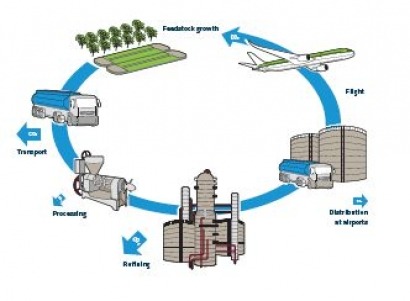
Progress in getting airlines to buy-into the use of aviation bio-fuels has been “amazing”, and since July, when, the global standards agency ASTM International gave approval for airlines to start flying on bio-fuels, six passenger carriers have embraced them, Steele said.
“While a lot of the technical work has been done, we need to continue to work on three important aspects,” Steele said. “Further research into new production techniques and feed stocks; ensuring that we can commercialise the bio-fuels opportunity and bring the right quantities of bio-fuels to airlines at the right price; and committing to robust sustainability standards worldwide that will mean bio-fuels for aviation don't have negative consequences for vulnerable communities."
Last year, the world's airlines spent $140 billion (€103 billion) on jet fuel.
This summer, ASTM International gave approval for airlines to start flying on bio-fuels made using the Hydrotreated Renewable Jet (HRJ) process. This followed approval for fuels using Biomass-to-Liquid (BtL) in their production.
The decision opens the door for airlines to fly commercial flights using up to 50 percent bio-fuels and to date six have done so: KLM, Lufthansa, Finnair, Interjet, Thomson Air and AeroMexico.
Currently, airlines are paying a price premium for using bio-fuels, but the industry expects that this will drop as more production capacity comes on stream and supply ramps up.
"Airlines are currently paying around three times the cost of Jet A-1 for the bio-fuels they are using, which is of course unsustainable in the long term," Steele said. "
But as the price of oil continues to rise and we work on new sources of bio-fuel, we can expect the two energy sources to reach parity. How quickly that happens depends on attracting the necessary investment and governments putting in place the right policy framework," he said.
Steele was unreserved in his assertions that Asian governments and industry have a fantastic opportunity to take advantage of sustainable aviation bio-fuels.
“Asia-Pacfic is one of the fastest-growing aviation regions in the world and became the largest aviation market in 2009,” he said. “The region will be using the mobility and connectivity that air travel brings to help drive economic growth. That growth can be achieved in a more sustainable way if Asian airlines take advantage of reducing their carbon footprint by up to 80% using bio-fuels.”
“Governments should also be taking advantage of this potential boost to the green economy with home-grown jet fuel a possibility,” he continued. “ The possibilities of using algae for aviation bio-fuel need to be explored in Asia and the exciting prospect of using municipal waste to produce bio-fuel will solve a landfill issue and provide airlines with a new stream of clean energy."
For additional information:

